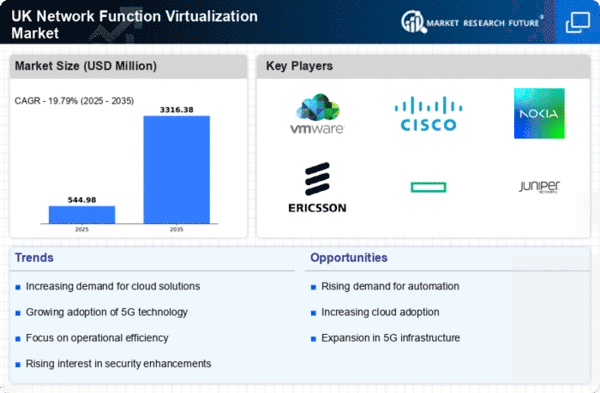Emergence of Edge Computing
The network function-virtualization market is being shaped by the emergence of edge computing, which is gaining traction in the UK. As businesses increasingly require real-time data processing and low-latency applications, the need for virtualized network functions at the edge becomes apparent. This shift allows for improved performance and reduced bandwidth costs, as data is processed closer to the source. The market is expected to witness a growth rate of around 18% as organisations adopt edge computing strategies. This trend is particularly relevant for industries such as manufacturing and healthcare, where timely data analysis is critical. Therefore, the network function-virtualization market is likely to see a surge in demand as companies embrace edge solutions to enhance operational efficiency.
Shift Towards 5G Deployment
The network function-virtualization market is poised for growth due to the ongoing shift towards 5G deployment across the UK. As telecommunications providers roll out 5G networks, the demand for virtualized network functions is expected to rise significantly. This technology enables operators to manage network resources more efficiently, ensuring optimal performance and reduced latency. Analysts project that the 5G rollout could lead to a market expansion of approximately 25% by 2027, as service providers seek to leverage the benefits of virtualization. The integration of 5G with network function-virtualization is likely to enhance service offerings, allowing for innovative applications in sectors such as IoT and smart cities. Thus, the network function-virtualization market stands to gain substantially from the advancements in mobile network technology.
Growing Demand for Cost Efficiency
The network function-virtualization market is experiencing a notable shift towards cost efficiency as businesses seek to reduce operational expenses. By virtualizing network functions, companies can eliminate the need for expensive hardware, leading to significant savings. In the UK, organisations are increasingly adopting this technology to streamline their operations and enhance service delivery. Reports indicate that the market could grow at a CAGR of approximately 15% over the next five years, driven by the need for more agile and cost-effective solutions. This trend is particularly evident in sectors such as telecommunications and IT services, where the pressure to maintain competitive pricing is paramount. As a result, The market is likely to see a surge in adoption as firms prioritise financial prudence alongside technological advancement..
Regulatory Compliance and Standards
The network function-virtualization market is significantly influenced by the evolving landscape of regulatory compliance in the UK. As data protection laws become more stringent, organisations are compelled to adopt solutions that ensure compliance with regulations such as GDPR. This has led to an increased focus on virtualized network functions that can provide enhanced security and data management capabilities. The market is expected to expand as businesses invest in technologies that not only meet compliance requirements but also improve operational efficiency. The potential for growth in this sector is underscored by the fact that compliance-related investments could account for up to 20% of IT budgets in the coming years. Consequently, the network function-virtualization market is poised to benefit from this heightened emphasis on regulatory adherence.
Increased Focus on Network Resilience
The network function-virtualization market is increasingly driven by the need for enhanced network resilience. As businesses in the UK face growing threats from cyberattacks and system failures, the demand for robust and flexible network solutions has surged. Virtualization allows for rapid recovery and redundancy, ensuring that critical services remain operational even during disruptions. This focus on resilience is reflected in the investment strategies of many organisations, with a projected increase of 30% in spending on network security and resilience technologies over the next few years. Consequently, the network function-virtualization market is likely to benefit from this trend, as companies seek to fortify their infrastructures against potential vulnerabilities.
















